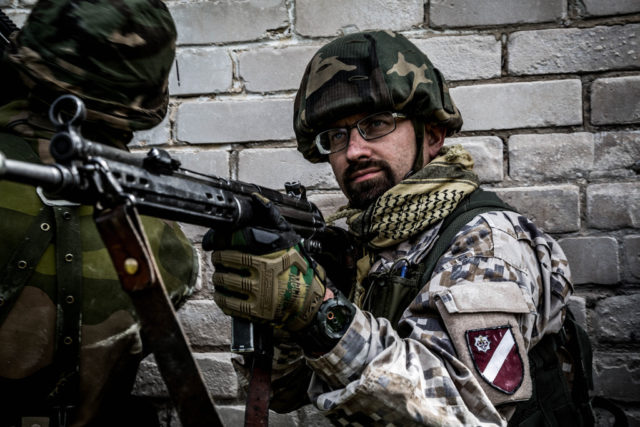
Latvia Focuses on Improving Societal Resilience and Increasing Size of National Guard
Publication: Eurasia Daily Monitor Volume: 15 Issue: 17
By:

In late January 2018, the Ministry of Defense of Latvia (MoD) reported plans to expand the National Guard (Zemessardzes) force to 12,000 by 2027. The largest component of the National Armed Forces and the basis Latvia’s territorial defense, the National Guard is currently made up of nearly 8,000 volunteers (Latvian Professional Army Units have around 6,000 personnel). These National Guard expansion plans fit with the broader concept of “comprehensive defense,” which Latvia has chosen to pursue instead of immediately trying to bring back conscription service. Ainārs Latkovskis, the head of the Defense, Interior Affairs and Corruption Prevention Commission within the Latvian Parliament, called the expansion plans ambitious but achievable. He noted that additional recruits could be drawn from the pool of young people who completed national defense training at school (Diena.lv, January 24).
The National Guard battalions have been developing high-readiness units since 2015. These units are made of the most active National Guard members who, in comparison with average volunteers, spend more days per year training and developing their skills. The high-readiness units include specialists in various fields, helping to provide engineering, air-defense and sniper capabilities for the National Guard. In order to improve training of the National Guard staff, the authorities conducted a number of basic and collective training exercises during 2017 by organizing boot camps and weekend training events (Diena.lv, December 12, 2017).
This year, upon reaching their first phase of development, the National Guard high-readiness units will carry out test exercises at the platoon level. While in the next stage, the units will develop skills to operate at the company level. Among National Guard priorities in 2018 is the acquisition of special equipment to fulfill these tasks. Two platoon-size high-readiness National Guard units will be created (Leta.lv, January 24).
Additionally, the Ministry of Defense plans to form six new National Guard battalion bases by 2021, in the districts of Riga, Jelgava, Bauska, Dobele, Krustpils and Gulbene, covering the central, western and eastern parts of the country (Nra.lv, January 22). The decision to create a professional military service battalion within the National Guard 3rd Latgale Brigade (Eastern part of Latvia) also will significantly benefit the National Guard’s overall growth in the coming years (Mil.lv, accessed February 1). “I have visited all units of the National Guard. We have hyper patriotic people. During the economic crisis [2008], there were very harsh conditions in which the development of the National Guard took place, and now the infrastructure needs to be improved in many National Guard battalions,” Minister of Defense Raimonds Bergmanis stated late last month (Diena.lv, January 24).
While growth of the National Guard is the main pillar of Latvia’s comprehensive defense concept, the latest legislative initiative pushed by the MoD emphasizes the role of society and every individual within the defense system. Namely, the whole of society must be involved in the protection of the state. Indeed, this sentiment is already found in the fourth paragraph of the preamble to the Latvian Constitution: “the people of Latvia protect their sovereignty, the independence of Latvia, the territory, its unity and the democratic state system” (Mk.gov.lv, accessed February 1). And yet, boosting the role of social resiliency in comprehensive defense will be challenging. A survey conducted a year ago revealed that, in the event of a military invasion, a third of the respondents would leave the country, a little more than a third would join the resistance, and a similar proportion would do nothing (Nra.lv, February 24, 2017).
The MoD’s new amendments to the National Security Law provide that, in the event of a military invasion, each citizen is obligated to resist an invading aggressor with all available means and to provide necessary support to the National Armed Forces, conduct civic disobedience, refuse to cooperate with illegal state administration institutions or the aggressor’s armed units, refuse to serve and work in the interests of the illegal administration, as well as refuse to participate in an illegitimate election or referendum (Mk.gov.lv, accessed February 1). “These are the duties that must be taken by every individual and society as a whole in the event of a crisis. These are small steps in the development of a comprehensive security system. What we are willing to do now is make people aware of what their responsibilities are. We have a general mobilization when it comes to defending the state. What we want to make clear with these amendments is the understanding that, if the nation does not want to defend the country, soldiers alone cannot do it either,” Defense Minister Bergmanis noted (Diena.lv, January 24).
According to the director of the Latvian Institute of Foreign Affairs, Andris Sprūds, “Based on historical experience, we know that we have not always been able to defend [the country] successfully, even in terms of non-violent resistance. Therefore, even if these amendments will not guarantee specific action, it is good that they will [at least] motivate people to think ‘what should I do in the worst-case scenario?’ ’’ (Diena.lv, January 24).
The amendments to the National Security Law also send a message to Russia that a potential conflict with Latvia would not end following a military invasion: to the contrary, an occupying force would face massive civil disobedience and a non-violent resistance. That said, Sprūds warns, “Russia knows very well that Latvian society is not homogeneous. Therefore, legislation alone will not change this—loyalty and action of a people in a crisis depends on the belief in the state, on economic prosperity” (Diena.lv, January 24).
Latvia as well as the other Baltic States understand that deterrence of their adversary will depend not only on the North Atlantic Treaty Organization (NATO), but also on a strong self-defense posture. Thus, the cohesiveness and resilience of their societies are of growing importance to regional states looking to shore up their defenses.



